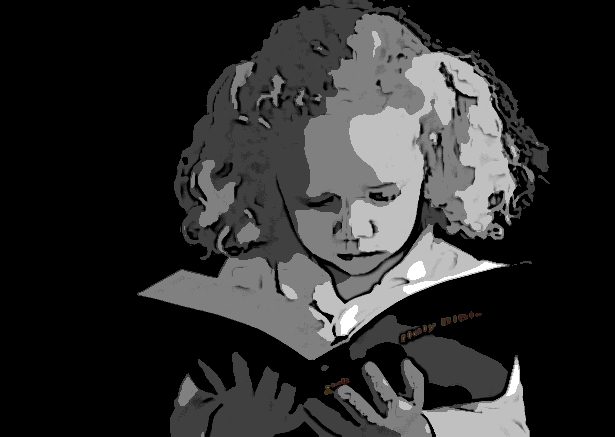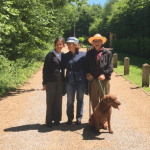 We take the horrifying stories in the Bible, water them down to make them palatable to children, and then teach them as “The Bible tells me so” truth because we say the Bible is true.
We take the horrifying stories in the Bible, water them down to make them palatable to children, and then teach them as “The Bible tells me so” truth because we say the Bible is true.
Kids ask the darndest questions. Previously, I tackled the question from a five-year-old granddaughter, “How do we know God is real? How do we know he’s not someone that because we are little you tell us he’s real, but then when we’re older we find out he’s fake.”
Today, it’s a question from a seven-year-old grandson, “How do we know that the Bible is true because all that you’re telling this is from the Bible?”
About time someone asked! And it brings me to a long-standing concern about how we teach the Bible to children. We take many of the horrifying stories in the Bible, water them down to make them palatable to children, and then explain them as “The Bible tells me so” truths.
There are dark, horrible stories in the Bible: are they true in the historical sense?
Take the story of Noah. God, angry and full of vengeance, decides to destroy everything and everyone. Just one dinky family and a few chosen animals escape the deluge. Every other living creature on earth gets wiped out.
It’s a dark, horrible story. Other Middle Eastern literature from around the same period contain similar stories. The Gilgamesh flood story is the most well known but there are lots of others.
When we Christians teach this dark, dark story, we sanitize it with “arky, arky” songs, pretty boats, and sweet animals all peacefully walking in. We also pretend that this is a true, historical event.
We do the same with the story of Jonah. We present it as great fun that he got swallowed by a whale and then try to justify teaching it as “truth” by seeing what kind of fish could swallow a human being (whales can’t) and not have him pretty thoroughly digested three days later.
Folks, the Noah story tries to make sense of a natural disaster. The Jonah story is satire, meant to nudge the hearers to repentance and abandonment of their evil ways. They are both “true” in the sense that they speak of significant issues of human existence. They are not “true” in the sense that they describe historical events.
Find the truth behind the text
To work with the text as truth, we must use the words and stories as the original hearers and writers meant. We do this by looking at context and examining the historical and cultural settings.
Something written as poetry needs to be interpreted as poetry, not as verifiable scientific fact.
We see one of the most beautiful passages in the Bible in Isaiah 55, which describes the hope of full reconciliation with God. Verse 12 reads, “For you shall go out in joy, and be led back in peace; the mountains and the hills before you shall burst into song, and all the trees of the field shall clap their hands.”
Now, will the trees suddenly grow hands and muscles clap them? Of course not. We rightly see this as poetry, a metaphorical way of describing a joy so profound that nature finds ways to celebrate it.
Remember, what we have now as written text came by way of oral traditions in pre-literate societies. People memorized the stories. They passed them down through the generations.
Poetry is far, far easier to memorize than prose. Think of the rhythms of “The Rime of the Ancient Mariner.” Here are a couple of the stanzas:
And through the drifts the snowy clifts
Did send a dismal sheen:
Nor shapes of men nor beasts we ken—
The ice was all between.
The ice was here; the ice was there,
The ice was all around:
It cracked and growled, and roared and howled,
Like noises in a swound!
How easy to commit that to memory! Between the rhythms, the rhymes and the repetition, it sits in the brain forever.
The first chapter of Genesis is poetry, not science
That’s the first chapter of Genesis: the mornings and the evenings of creation and “God saw that it was good.” Read it as a piece of exquisite poetry that teaches the glory of God and bestows upon human beings the image of that creative glory.
When we attempt to read it as a scientific treatise, we do violence to the text. It is true. It offers us the truth about the nature of God, the nature of the physical world and the nature of humanity: all good and all to be cherished in their goodness.
But how do we teach it to children? Too often, as “In six 24 hour days, God made the world and it all happened about 6000 years ago because that’s what the Bible says.” So when children and youth, assured by their parents and church that this is “true” come face to face with rigorous science, many walk away from their faith.
This seven-year-old is already asking what a lot of later teens want to know: “What is truth? Is the Bible trustworthy?”
Well, no when we insist on misusing the texts like this. We need raw honesty, not whitewashed cutesy stories. Let’s face with courage and honesty both the beautiful and the horrifying parts of the Bible.
 Let us forever leave behind the poem, itself so very easy to memorize, “The Bible says it, I believe it, that settles it for me.” Otherwise, we can and do use the Bible to justify slavery, mistreatment of women, and slaughter of the outsider, among other things.
Let us forever leave behind the poem, itself so very easy to memorize, “The Bible says it, I believe it, that settles it for me.” Otherwise, we can and do use the Bible to justify slavery, mistreatment of women, and slaughter of the outsider, among other things.
If we want the next generation to respect the Bible as the word of God, it is time we treat the Bible with more respect. Then we can affirm that it is true, but not because it is either historically accurate or a science textbook. It’s neither.
Next week, and this is a question that the dad of those two kids asked when he was young, “Mom, what would have happened if Adam had picked up a tree limb and beaten the **** out of the serpent?”
What questions do your children and grandchildren have? Send them to me and I’ll do my darndest to answer them!
Note: A version of this column is slated to run in the Denton Record-Chronicle. The Thoughtful Pastor, AKA Christy Thomas, welcomes all questions for the column and would especially like questions your children/grandchildren/students ask. Although the questioner will not be identified, I do need a name and verifiable contact information in case the newspaper editor has need of it. You may use this link to email questions.
Photo Source: © Thefreemangroup | Dreamstime.com, modified by Christy Thomas













